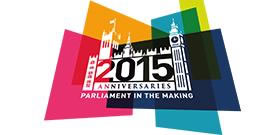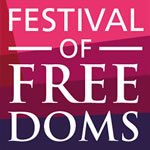Parliament Comes To Putney
Part of a series of free talks, debates, exhibitions and walks
Festival of Freedoms, part of Parliament’s year-long culture and education programme to commemorate the anniversary of Magna Carta and the Montfort parliament of 1265, is coming to Putney. The festival celebrates 800 years of rights and representation through a series of more than 30 events.
Each event will examine major political movements and moments in the UK’s constitutional past, starting with King John’s acceptance of Magna Carta at Runnymede in 1215 through to Parliament in 2015. In Putney, events will commemorate the Levellers and the famous Putney Debates of 1647, with a pop-up exhibition in The Exchange Shopping Centre and a talk at St Mary’s Church - the site of the original debates.
| TALK: The Putney Debates and the Levellers Saturday 12 September, 2pm St Mary’s Church & Gardens, Putney High Street, London, SW15 1SN Professor Justin Champion discusses the ground-breaking 1647 debates, which paved the way for many of the civil liberties we value today. EXHIBITION - The Putney Debates: democratic pioneers Tracing the roots of our democratic ideals back to the ground-breaking Putney |
The Rt. Honourable John Bercow MP, Speaker of the House of Commons, said: “For 12 days in November 1647, at the height of the Civil War, soldiers of Oliver Cromwell’s New Model Army and civilian representatives known as the Levellers, held a series of extraordinary debates in Putney on the constitution and the future of England. These ground-breaking debates paved the way for many of the civil liberties we value today. The Putney Debates represent a significant moment in the development of British democracy and I am delighted that Parliament is able to bring some of that history to life in the very place where it was made.”
 1647 The Putney Debates - 'Sprig of Rosemary' -Artist's Statement:
To identify themselves to each other, the Levellers wore sprigs of rosemary in their caps. This banner depicts a single sprig of rosemary on a dark blue background, focusing on the sprig as an emblem while drawing on the multiple associations of rosemary—its geographical origins and differing definitions.
1647 The Putney Debates - 'Sprig of Rosemary' -Artist's Statement:
To identify themselves to each other, the Levellers wore sprigs of rosemary in their caps. This banner depicts a single sprig of rosemary on a dark blue background, focusing on the sprig as an emblem while drawing on the multiple associations of rosemary—its geographical origins and differing definitions.
Rosemary is known as the ‘dew of the sea’ and the ‘rose of Mary', and also has commemorative associations. In Hamlet, which was written only 50 years before the Levellers formed, Ophelia says: ‘There’s rosemary, that’s for remembrance. Pray you, love, remember.’
The blue background derives from the representation of Simon de Montfort in stained glass in Chartres Cathedral, and echoes the etymology of rosemary as a herb of the sea, which originates in North Africa and the Mediterranean. The banner also speaks to the notion of ‘democracy to come’—those people who have yet to arrive at our shores. Rosemary grows wild on the Gallipoli peninsula, and sprigs are worn on Anzac day (25 April) to commemorate the Gallipoli campaign of 1915.
The free pop-up exhibition, ‘The Putney Debates: democratic pioneers’ will run in The Exchange Shopping Centre daily from 1 – 12 September (Mon – Sat 9am – 6pm, Sun 11am – 5pm) and explore ideas about universal suffrage, religious freedoms and democratic ideals. The talk, ‘The Putney Debates and the Levellers’ will be given by Professor Justin Champion from Royal Holloway, University of London. It will be held in St Mary’s Church at 2pm on 12 September as part of the Totally Thames Putney Funday. Tickets are free. More information, including booking information, can be found on www.parliament.uk/festival-of-freedoms
There are 30 events in the programme, around half of which are in the Houses of Parliament, including a special Open House weekend 19 – 20 September. All of the events are open to the public and, for the most part, are free to attend. The themes for the events reflect the subjects of a banner exhibition currently hanging in Parliament’s Westminster Hall. Information about how to visit can be found on: www.parliament.uk/banners-exhibition
 Events within the festival will question the impact of equality legislation, draw parallels between 18th century petitioners and the methods of petitioning Parliament today, examine parliamentary recording and reporting, unearth hidden histories and introduce attendees, sometimes in person, to political and democratic pioneers. Others will spotlight moments – such as the Putney Debates of 1647, the People’s Charter in 1838, and the struggle of the Tolpuddle Martyrs – when people may not have achieved rights or liberties, but instead articulated the aspiration for them in a way which still resonates today. The festival will also provoke discussion about the impact of key pieces of legislation, including the 1965 Race Relations Act, the 1967 Sexual Offences Act, and the 1995 Disability Discrimination Act.
Events within the festival will question the impact of equality legislation, draw parallels between 18th century petitioners and the methods of petitioning Parliament today, examine parliamentary recording and reporting, unearth hidden histories and introduce attendees, sometimes in person, to political and democratic pioneers. Others will spotlight moments – such as the Putney Debates of 1647, the People’s Charter in 1838, and the struggle of the Tolpuddle Martyrs – when people may not have achieved rights or liberties, but instead articulated the aspiration for them in a way which still resonates today. The festival will also provoke discussion about the impact of key pieces of legislation, including the 1965 Race Relations Act, the 1967 Sexual Offences Act, and the 1995 Disability Discrimination Act.
September 10, 2015
